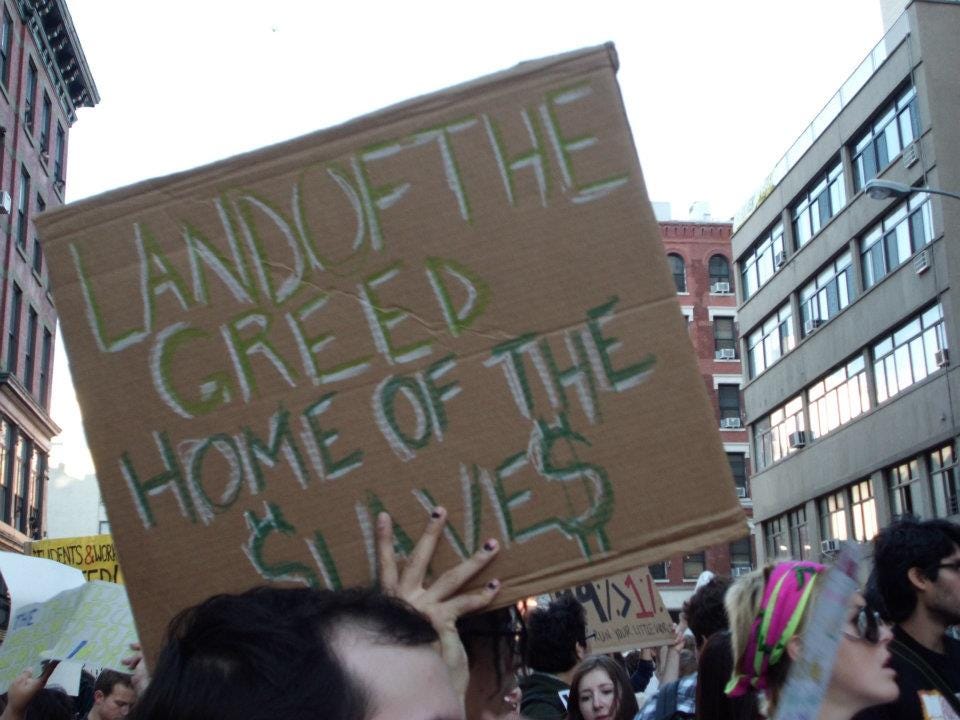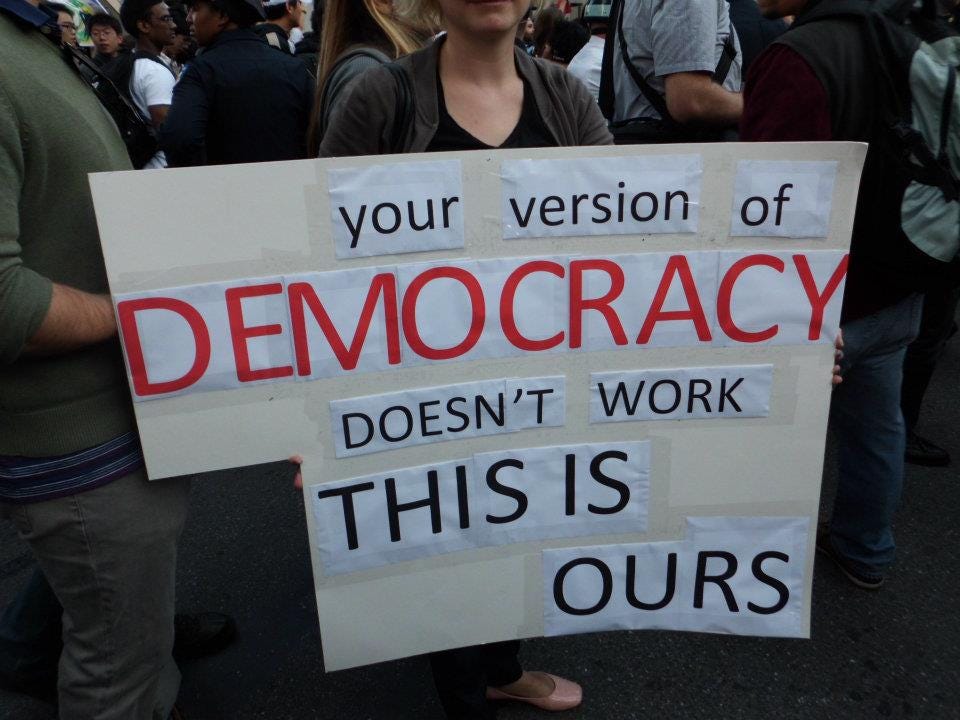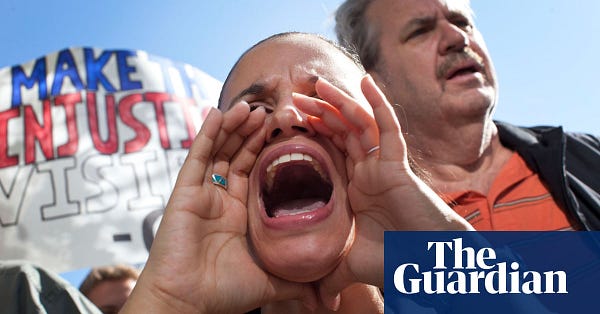#8
Life Can Be Different: 10 Years Ago, Occupy Wall Street Changed the World. The Guardian. September 15, 2021.
“I sprinted down 7th Avenue, down 6th Avenue, across Canal Street. Trucks and cars stood still as the bodies flooding the street halted their movement. People walked out of stores to cheer. Children pressed their faces to backseat windows while parents held up peace signs from the front.”
I wrote the preceding words on November 20, 2011, sitting in my NYU dorm room, just off Union Square. I was describing a protest that I’d attended three days earlier, on the two-month anniversary of Occupy Wall Street. It was a first attempt at thinking through the previous two months of my life—the first moment I had slowed down enough to begin to process the warp-speed political education and social evolution I had experienced since September 17, 2011.
Now, those words are the start of my latest feature, a look at the impact of Occupy Wall Street—on both its participants and the country—on the movement’s ten-year anniversary, published today by The Guardian. This piece has been in the works for over six months, but it has really been a decade in the making. I reported on Occupy Wall Street as an intern at the Village Voice before the movement had even begun, and then covered the first day of protests ten years ago this Friday. I continued writing about it throughout the fall of 2011, and intermittently for years after.

My Guardian story focuses on three women who were deeply involved with Occupy and who continue to feel the effects of it in their lives, personally, professionally, and politically. I wanted to look at the lingering impact social movements have on their participants—something I find is often left out of mainstream depictions of movements and their legacies. I also share a bit of my own Occupy story and include quotes from a recent conversation I had with Noam Chomsky, now 92 years old. (When I Zoomed with Chomsky, I held back from telling him that his mom had been the principal of my dad’s Hebrew school in Philadelphia, but I will not withhold that tidbit here.)
On a Thursday morning this past July, I biked from my Brooklyn neighborhood to Manhattan’s financial district, arriving at Zuccotti Park, once home to New York’s Occupy Wall Street encampment, at about 10am. I’d long marveled at the way a protest is so all-encompassing, and then you walk just a block away and it’s like nothing is happening at all—marveled at the way I, as a white woman, go from target to innocent in the eyes of the state in the course of that block. But walking into Zuccotti, I immediately thought about how spaces possess that trait, as well. This space, once so contentious and so vibrant, had so easily reverted back to a sanitized corporate park.
I’d remembered the red sculpture at the southeast corner and the steps that formed an amphitheater, but the rest of the park had faded into my memory as a sea of people and tables and tents, of drumming and chanting and twinkling fingers.
I’d joked to friends that I was coming here to have an emotional moment that I could write about, but I’d assumed I’d just jot down a few notes, take some photos, and move on, a bit let down by the whole excursion but at least it was an excuse for a morning ride across the East River. But now I was actually having that moment, or something akin to it—not emotional, but the space was, undeniably, triggering thoughts. I leaned my bike against a bench in the center of the park and typed furiously into a note on my phone, writing what would become the closing lines of my Guardian story.
Occupy redirected—or accelerated, as one of the women in my story so aptly put it—nearly every aspect of my life: the classes I took, the stories I reported, the people with whom I spent, and still spend, time. It led me to years of researching social movements in college and graduate school, and to reporting across the United States and Europe. It led me to jobs and journalism assignments and dear friends around the globe—a decade of chasing the energy I first encountered in the streets of New York City during those months at the end of 2011.
It was challenging to write about Occupy: to neither understate nor overstate its impact, to avoid romanticizing it, to acknowledge its shortcomings, to remember it clearly—in facts and dates and photos, rather than in hazy memories of inside jokes and twenty-first-birthday drinks and (so, so many) organizing meetings. In researching this story, I revisited articles I wrote while Occupy was still happening and looked through countless images created during that time. My first draft was more than twice as long as the published version—I spared even my editor the earliest iterations. Distilling this transformative experience down to its most essential aspects, for the three women I feature and myself, was an arduous process.
This is the result: a snapshot of what Occupy felt like for a few people back in 2011, and the many ways, both minuscule and massive, that the movement continues to play on the lives of both the participants and the country a decade later.
Life Can Be Different: 10 Years Ago, Occupy Wall Street Changed the World. The Guardian. September 15, 2021.
As always, you can find the full archive of past newsletters here.








